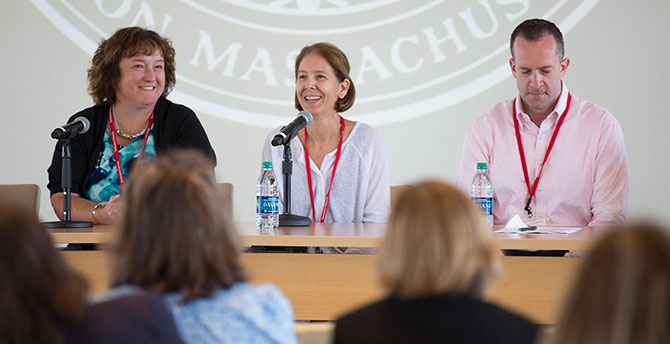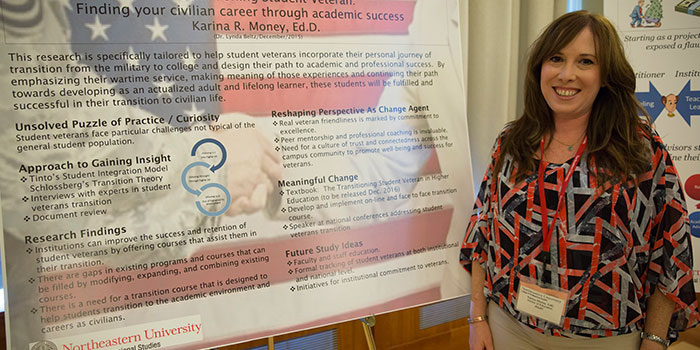Why professionals choose to pursue a Doctor of Education varies. Some want to fulfill a personal goal, while others want to gain credibility in their field, build on their master’s degree, or advance their career. No matter the rationale, making the decision to take the next step requires careful consideration. But, according to current and former Doctor of Education students who spent the last week of July on Northeastern’s Boston campus, it’s a decision that pays off.
Download Our Free Guide to Earning Your EdD
Learn how an EdD can give you the skills to enact organizational change in any industry.
The university’s Doctor of Education (EdD) program recently held its summer residency—an intensive week of workshops, networking, group activities, and presentations. Students engaged with faculty on a diverse range of research topics and theories, while talking with fellow classmates about how they’ve applied their coursework to their own career.
“I researched what I was doing [in library science] and could then improve what I was doing based on my research,” said Georgina Trebbe, an alumna who presented her thesis on building stronger student researchers at the summer residency’s alumni poster session. “The degree gives you credibility among your peers. Now when I speak, I speak with evidence.”
Fellow alumni and students explained why they chose to pursue an EdD and shared candid advice for those currently enrolled in the program. For those interested in earning an EdD of their own, here are some factors and tips to consider.

Patricia Corbett, Mary Jo Rendon, and Scott Morrison on the Student Panel | Image via Julio Chuy
A Doctorate Takes Sacrifice and Perseverance
“Getting your EdD takes resilience, grit, and perseverance,” said EdD candidate Scott Morrison, superintendent of the Tri-Town School Union, during the summer residency student panel. “It’s a true test of your strength to see something from the beginning to the end. There’s such a sense of pride when you make it to the end.”
Fellow panelist Mary Jo Rendon, a family and community engagement specialist for the Finish Strong Program at Waltham High School, echoed Morrison’s sentiment. “There’s a lot of sacrifice,” she said, acknowledging, “There were a lot of beautiful weekends I spent in the library from nine to five, but my role as a scholar-practitioner has stimulated me.”
Enrolling in an EdD program is as much an emotional investment as it is financial. Most EdD candidates are balancing full-time jobs, busy family lives, and rigorous coursework. “Life gets in the way” was repeated throughout the student panel, but so was, “and that’s OK.” Students were encouraged to take their time and not chastise themselves if they get stuck on their topic or slow down their studies.
“Don’t equate duration with difficulty,” Morrison said. “Let yourself manipulate the ideas in your mind. You’ll figure it out. Your goal shouldn’t be to get [your thesis] done. Your goal should be to get it done well.”
Know Your Topic May Change
For those who do waver on their topic, know it’s normal to change course.
“I struggled and switched my topic,” acknowledged Patricia Corbett, chair of the social science and education departments at Great Bay Community College. “But once I got it, I fell in love with it.”
Although switching topics seems like it would require extra work, students will have laid the foundation. Because they’ve already completed some of the steps, the process will be easier the second time around.
“You need to be somewhat flexible with your topic and work with your [dissertation chair],” said Art LaMan at the summer residency’s alumni poster session.
LaMan finished defending his thesis at Northeastern nearly two years ago, noting, “The degree changed the way I approached teaching. It changed the way I view the world. It was the hardest thing I’ve ever done, but also the most intellectually rewarding.”
Stay Confident
The idea of defending your thesis can seem daunting—and for good reason. You’ve spent years researching a particular topic and constructing a compelling argument. That’s the same reason, however, why you shouldn’t lose confidence.
“I would really challenge you to be confident,” said Robert Lilley, who recently, and successfully, defended his thesis on career and technical education programs. “You’re the expert of your work. Any questions they ask you, you know the answer.”
Kelly Conn, an assistant teaching professor in the Doctor of Education program, assured students that, “As dissertation chairs, we would not let you defend your thesis unless you were ready.” Although some might need to revisit their work after their defense, it’s typically to “enhance” the content, according to Conn, rather than rewrite it completely.

Karina Maroney | Image via Julio Chuy
Keep Your Motive in Mind
Going into an EdD program with a clear goal of what you hope to achieve will help keep you focused and inspired. Whenever you’re stuck, asking yourself, “Why did I start this?” can be reenergizing.
“I enrolled in the Doctor of Education program because I wanted to push myself personally and as an educator,” said Mary Ellen Janeiro, an English language arts teacher at Andover Public Schools, who defended her thesis in 2015. “I was encouraged to be a voice for the underserved student.”
Karina Money, the founder of career and educational consulting firm Right Path New England, wanted to speak for a different underserved audience and decided to pursue her doctorate so she could build on her master’s degree.
“I wanted to be able to take what I was learning, put it into practice, and apply it to my career,” said Money, whose thesis focused on what colleges nationwide are doing to help veterans. “Now I have a textbook coming out to help student veterans.”
As alumni reminisced on their journey, Steven Smith, a first-year EdD student, has started looking ahead at what’s next in his career. “I want to be a college president,” Smith said. “I want to be in a position where I can make a difference to a large amount of people.”
And Smith is leveraging Northeastern’s Doctor of Education program to help him take that next step.







Related Articles
What is Learning Analytics & How Can it Be Used?
Why I Chose to Pursue Learning Analytics
EdD vs. PhD in Education: What’s the Difference?